Eco-Friendly Cup Carriers Selection Guide
What’s the Problem with Cup Carriers We Are Facing Now?
Types of Eco-Friendly Cup Carrier
- Recycled Cardboard
- Benefits of Recycled Cardboard Cup Carriers
- Limitations of Recycled Cardboard Cup Carriers
- Plant-Based Bioplastics
- Benefits of Plant-Based Bioplastics Cup Carriers
- Limitations of Plant-Based Bioplastics Cup Carriers
- Plant Fibers
- Benefits of Plant Fibers Cup Carriers
- Limitation of Plant Fibers Cup Carriers
The modern urban lifestyle is accustomed to ordering a drink at any time to enrich daily work and life, leading to a growing demand for delivery services. There is a demand for something inconspicuous yet increasingly indispensable, and that is the cup carriers.
In the past, a large number of disposable plastic cup carriers were used, leading to serious environmental pollution. A significant amount of plastic products are being buried, incinerated, or accumulating in the oceans, highlighting the urgent need for eco friendly cup carriers.
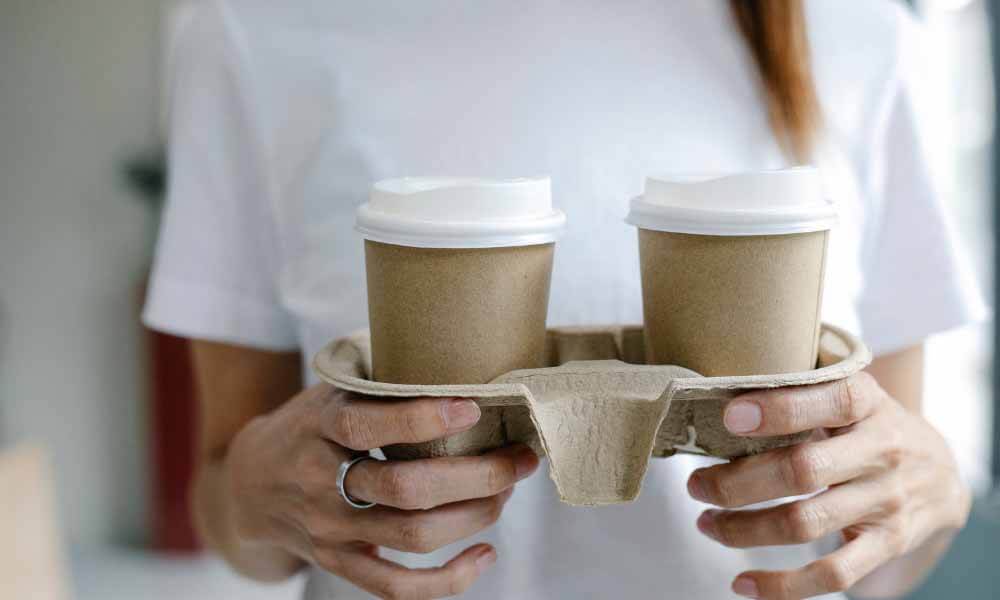
What are Cup Carriers?
Cup carriers are designed to hold and transport soft drinks and coffees. They can be made from different materials, such as plastic, cardboard, and fiber plants with various sizes to accommodate different sizes of cups. They are normally designed with 2, 4, or 6 compartments or slots to securely hold each cup in place.
What’s the Problem with Cup Carriers We Are Facing Now?
Traditional cup carriers are typically made from non-biodegradable plastics or Styrofoam. Due to the drink carriers are designed for single use, after they are used and discarded in large quantities, they can remain in the environment for hundreds of years, posing a threat to the environment, wildlife, and humans.
The Current Serious Situation
- Billions of cup carriers are used worldwide each year, white pollution is becoming more and more serious.
- Part of the disposable drink carriers end up in landfills, they take centuries to decompose.
- Millions of tons of plastic waste, including plastic drink carriers, enter the ocean every year.
- Studies estimate that by 2050, there could be more plastic than fish in the world’s oceans if current pollution trends continue.
Why are Current Cup Carriers Difficult to Handle?
In order to protect the environment, it is better not to burn, discard, or bury the plastic. But, can we recycle the plastic drink carrier? The answer is: that we are facing many challenges when we are dealing with them.
Contamination
Cup carriers used for food and beverage are always in contact with oils, liquids, and food residue, which makes them difficult to recycle.
Lack of Infrastructure
Not all countries and regions have the ability to equip the necessary recycling facilities. For these areas that do not have the equipment, it is hard for them to process large quantities of plastic waste, including beverage carrier.
Non-Recyclable Materials
Some disposable drink carriers are made of low-grade plastic or with other mixed materials, they are also not eligible for recycling.
Consumer Behavior
It is also difficult to rely on individual consumers to properly handle the coffee cup carrier in their hands.
With these problems and challenges, there is an urgent need to switch to eco-friendly cup carrier.
Types of Eco-Friendly Cup Carriers
The eco friendly drink carrier tray can be made from a variety of renewable and biodegradable materials, let’s take a look at the most common eco-friendly materials that are used to make the drink carrier.
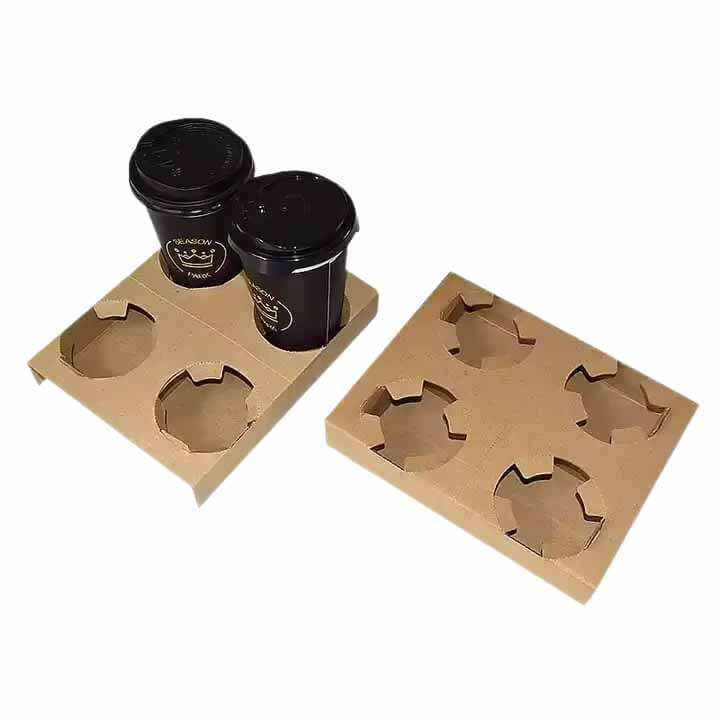
Recycled Cardboard Cup Carriers
Cup carriers made from recycled cardboard are a good choice to replace plastic carriers. This material is compostable and can be easily recycled after use.
Benefits of Recycled Cardboard Cup Carriers
- Eco-Friendly: Made from post-consumer waste, reducing the demand for new materials.
- Biodegradable and Compostable: Cardboard is biodegradable. This material can break down naturally in the environment without any harmful components.
- Easily Recyclable: This material is recyclable, so after use, the cup carrier still can be recycled.
- Customizable and Brandable: Recycled cardboard drink carriers allow businesses to customize their brand and logo on it.
- Cost-Effective: To replace the plastic carrier, the cost of recycled cardboard cup holders may be a little bit higher. But, due to it being recycled material, they are cost-effective while supporting environmental sustainability.
Limitations of Recycled Cardboard Cup Carriers
- Limited Liquid Resistance: Cardboard is actually a kind of thicker paper, it has limited liquid resistance. So try to avoid contact with items with high water content.
- Less Durability: Compared with other eco-friendly materials, cardboard material is less durable, especially if you expose the material to wet or humid conditions.
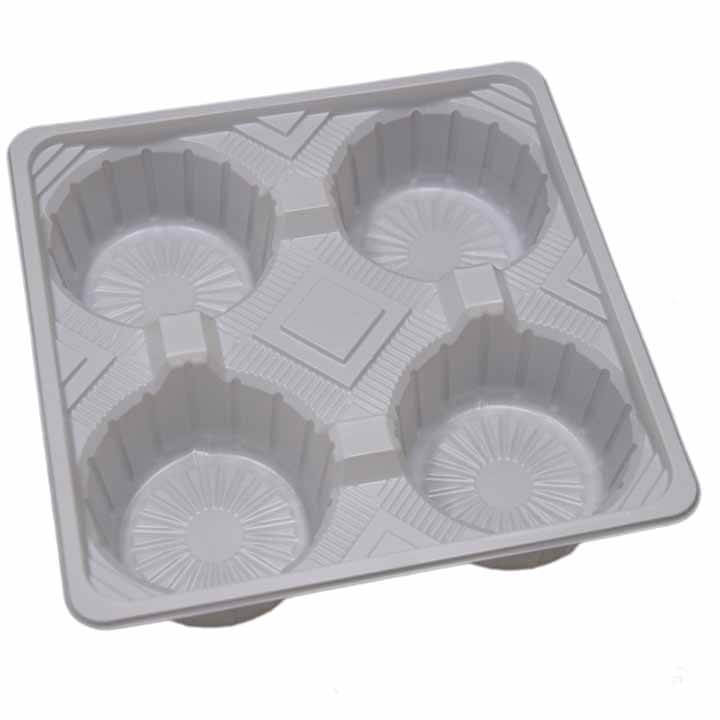
Plant-Based Bioplastics Cup Carriers
This material is from plant sources like cornstarch or sugarcane, the plant-based bioplastics look like traditional plastic, but it is compostable and more eco-friendly than petroleum-based counterparts. What are the common biodegradable plastics on the market?
PLA (Polylactic Acid)
PLA is a biodegradable polymer derived from cornstarch or sugarcane, widely used to produce compostable tableware, including the cup carrier.
PSM (Plastarch Material)
PSM is a biodegradable thermoplastic derived from plant starch. This material can customize clear, heat-resistant, and compostable cup carriers.
PBAT (Polybutylene Adipate Terephthalate)
PBAT is a biodegradable and compostable material, which also can be used to customize the to go cup holder.
Benefits of Plant-Based Bioplastics Cup Carriers
- Reduced Carbon Footprint: Plant-based bioplastics have a lower carbon footprint than traditional plastic since they can absorb carbon dioxide during the plant growth process.
- Biodegradability: The material can break down quicker than traditional plastic, but there is controversy about its decomposition time, and the natural decomposition time varies widely based on the varying qualities on the market.
- Renewable Resources: The raw material is renewable, which is better than finite fossil fuels.
- Non-Toxic: The raw material is derived from naturally grown plants, with no harm to the human body or environment.
Limitations of Plant-Based Bioplastics Cup Carriers
- Cost: The drink carriers made from plant-based bioplastics are more expensive than the conventional plastic cup carriers.
- Limited Availability: The infrastructure for producing plant-based bioplastics is not as developed as that for traditional plastics, the production capacity of plant-based bioplastics beverage carriers is limited. Also, it looks very similar to traditional plastic carriers, It is easy for opportunistic sellers to pass off substandard products.
- End-of-Life Options: Plant-based bioplastics can be recycled or composted after use, but this may be limited due to local infrastructure and regulations. There is considerable controversy over the natural degradation of this material.
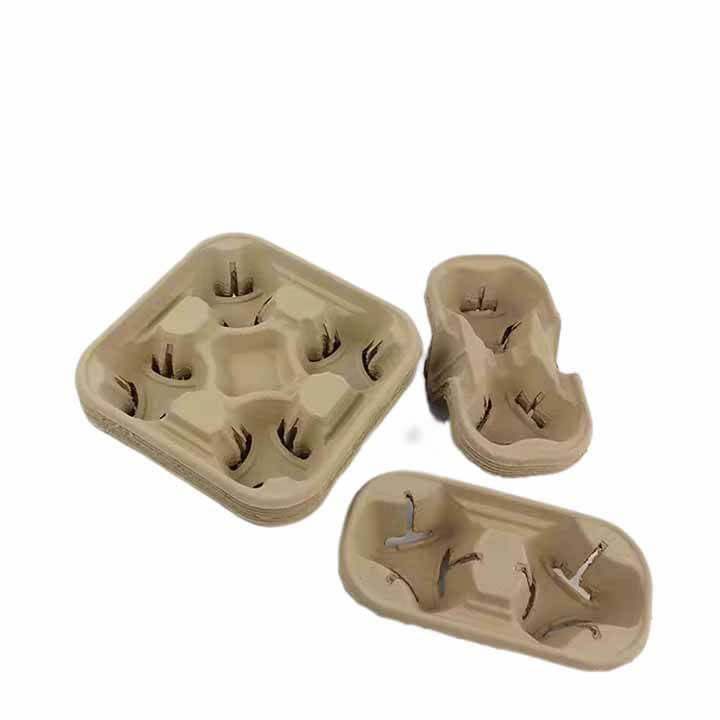
Plant Fibers Cup Carriers
The cup carrier tray made from plant fiber is totally biodegradable and compostable, they can break down naturally within 2 months. Let’s take a look at the raw materials of these plant fibers.
Bagasse
Bagasse is a byproduct of sugarcane processing, which is widely used to create sturdy and biodegradable packaging, including the cup carrier tray, a great eco-friendly alternative to traditional plastics and styrofoam.
Wheat Straw
Wheat straw is a raw material very similar to bagasse, their features are almost the same, so this material is always used to produce biodegradable tableware.
Benefits of Plant Fibers Cup Carriers
- Sustainability: The main materials of plant fiber used to produce beverage carrier is bagasse and wheat straw, they are renewable resources that make our environment sustainable.
- Biodegradability: Plant fiber is biodegradable, this material can break down naturally within 60 days.
- Compostability: Most plant fibers are compostable, especially the 2 main materials that are widely used to produce the eco friendly disposable plate, they allow for organic waste diversion and nutrient-rich soil production. So, this is also a great material to make disposable cup carriers.
- Reduced Carbon Footprint: Producing plant fiber generates less greenhouse gas than producing plastic, this is why we recommend using this material to produce drink carriers.
- Strength and Durability: The beverage carrier made from plant fiber is strong and durable enough to hold your drinks in your bag while transporting.
- Versatility: The disposable drink carriers made from plant fiber can be used for both cold and hot drinks.
- Consumer Appeal: Packing your drinks with the plant fiber cup carriers will leave a good impression on environmentalists in your beverage store, and it will also make your customers feel that you are a store that pays attention to product quality and hygiene.
- Brand Image: The plant fiber material allows you to custom disposable cup carriers with your brand name, logo, slogan, or something you want to promote your restaurant.
Limitation of Plant Fibers Cup Carriers
- Cost: Plant fiber cup carriers cost will be more expensive than plastic material, so you should consider the packing cost of your business.
You may interested in how to produce plant fiber cup carriers, they are molded pulp products that can be processed into various shapes through the pulp molding process.
Now you have a deeper understanding of eco-friendly cup carriers, which will facilitate bulk purchasing for you. Eco March is one of the molded pulp packaging manufacturers in China, you can custom eco friendly packaging from us at an affordable price with consistent quality.
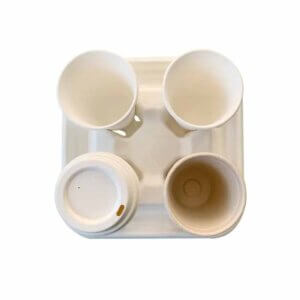
John Q
John Q is Eco March’s Product Manager. With 5 years of prior experience in the food industry after graduating from university, he has been an integral part of Eco March. He excels in creating and developing eco-friendly food packaging products with a keen focus on enhancing the consumer experience.


